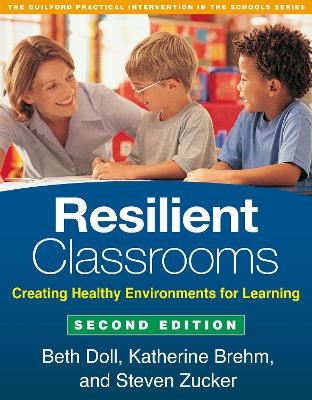
Resilient Classrooms, Second Edition
Guilford Press (Verlag)
978-1-4625-1334-5 (ISBN)
New to This Edition
*Incorporates a substantial new research base.
*Expanded K-9 grade range.
*Discussions of timely topics: English language learners, cultural diversity, response to intervention, and positive behavior supports.
*Most case studies are new.
*Seven additional reproducibles (intervention strategy sheets).
This book is in The Guilford Practical Intervention in the Schools Series, edited by Sandra M. Chafouleas.
Beth Doll, PhD, is Associate Dean for Academic Affairs and Professor of School Psychology in the College of Education and Human Sciences at the University of Nebraska-Lincoln. She has served as an officer or president of three state school psychology associations as well as Division 16 (School Psychology) of the American Psychological Association. Dr. Doll's research addresses models of school mental health that foster resilience and enhance the well-being of students and program evaluation strategies that demonstrate the impact and accountability of school mental health services. She has published journal articles on issues of resilience, school mental health, self-determination, the identification of emotional disabilities, and students' friendships. Dr. Doll generally works within collaborative groups that include school practitioners and other community members, and involves graduate students as full members of these groups. Katherine Brehm, PhD, is a practicing school psychologist with experience in the Ysleta Independent School District (Texas) and Denver Public Schools (Colorado). She has been a member of the school psychology faculty at the University of Texas at El Paso and the University of Colorado at Denver. As a school psychologist, Dr. Brehm led her district in developing cross-disciplinary roles for school psychologists that increase the relevance of mental health services to learning, provided inservice training on teaching children with attention deficits, and planned for the district's implementation of standards-based education. She has conducted research in consultation, has coauthored a book on interventions for school emotional and behavioral problems, has published nationally on the topic of resilience, and has completed postdoctoral training in family therapy and neurological practices. Steven Zucker, PhD, is a private consultant in school psychology in the Denver metropolitan area. He was a member of the faculty of the University of Colorado at Denver, practiced as a school psychologist for 17 years in the Cherry Creek Public Schools (Colorado), and was instrumental in creating a school environment that valued the full inclusion of students with disabilities. Dr. Zucker co-crafted Colorado's Blueprint for the Future, the state's agenda for integrated educational and mental health services for students. He has presented statewide and nationally on resilience, systems change, and inclusive practices. Dr. Zucker co-developed the ClassMaps model with Dr. Doll and served as a coordinator on the first ClassMaps project. His experience as a practitioner with inclusion, systems change, and school mental health has been invaluable in the preparation of this book.
1. Introduction to the Resilient Classroom
2. What Are Resilient Classrooms?
3. Relationship Characteristics of Resilient Classrooms
4. Autonomy-Promoting Characteristics of Resilient Classrooms
5. Assessing the Resilience of Classrooms
6. Convening the Systems for Change
7. Including the Classroom's Students in Planning and Decision Making
8. Developing and Implementing Effective Strategies
9. Evaluating the Impact of Resilient Classrooms for External Audiences
10. Integrating the Resilient Classroom with Existing School Mental Health Services
Appendix A. ClassMaps Survey
Appendix B. Worksheets
| Erscheint lt. Verlag | 6.3.2014 |
|---|---|
| Reihe/Serie | The Guilford Practical Intervention in the Schools Series |
| Verlagsort | New York |
| Sprache | englisch |
| Maße | 203 x 267 mm |
| Gewicht | 540 g |
| Themenwelt | Geisteswissenschaften ► Psychologie ► Entwicklungspsychologie |
| Geisteswissenschaften ► Psychologie ► Pädagogische Psychologie | |
| Medizin / Pharmazie ► Medizinische Fachgebiete ► Psychiatrie / Psychotherapie | |
| Sozialwissenschaften ► Pädagogik ► Sonder-, Heil- und Förderpädagogik | |
| Sozialwissenschaften ► Soziologie | |
| ISBN-10 | 1-4625-1334-4 / 1462513344 |
| ISBN-13 | 978-1-4625-1334-5 / 9781462513345 |
| Zustand | Neuware |
| Haben Sie eine Frage zum Produkt? |
aus dem Bereich


